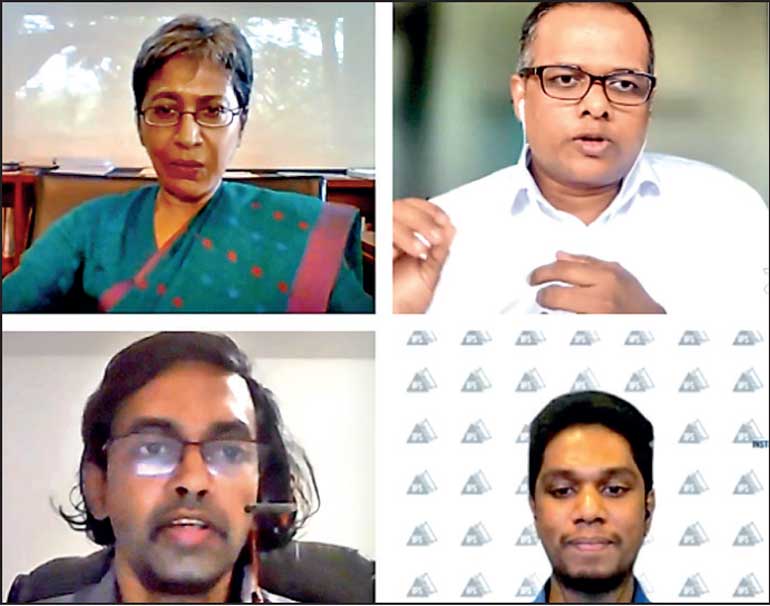Saturday Feb 21, 2026
Saturday Feb 21, 2026
Wednesday, 13 October 2021 00:26 - - {{hitsCtrl.values.hits}}
 The Institute of Policy Studies of Sri Lanka (IPS) hosted the first of a three-part webinar series to launch its annual flagship report ‘Sri Lanka: State of the Economy 2021’ on Monday.
The Institute of Policy Studies of Sri Lanka (IPS) hosted the first of a three-part webinar series to launch its annual flagship report ‘Sri Lanka: State of the Economy 2021’ on Monday.
The first webinar was on ‘COVID-19 and the Sri Lankan Economy: Policy Choices and Trade-offs’. It featured presentations by Dr. Dushni Weerakoon and Dr. Asanka Wijesinghe from the IPS with expert insights from Johns Hopkins University, USA Financial Economist Dr. Missaka Warusa-witharana. Tharindu Udayanga from IPS moderated the discussion.
Dr. Weerakoon stated that a V-shaped recovery was likely as predicted in last year’s ‘State of the Economy’ report. She noted that a growth rate of 4% this year would take the economy back to the pre-pandemic output level, but the challenge was to lift the growth rate to 5-6% and maintain that in the medium term.
Debt monetisation is not the answer beyond its use as a temporary measure; rather building policy credibility to firm up access to capital markets is critical. The Government must commit to strengthen revenue mobilisation, reduce leakages, and improve the efficiency of existing expenditure, she said.
Dr. Wijesinghe opined that Sri Lanka should capitalise on trade diversion resulting from the China-US trade war and increase both forward and back Global Value Chain (GVC) participation. He explained that producing goods with a low comparative advantage was costly, and as such, import substitution was not an appropriate long-term policy for Sri Lanka as a small country that did not have all the raw materials. The way forward is to step away from the ‘anti-trade bias,’ secure GSP+, integrate with GVCs and restructure existing regional trade agreements, Dr. Wijesinghe outlined.
Dr. Warusawitharana reflected that Sri Lanka’s growth trajectory had been below par since the end of the war in 2009. The current fiscal difficulties are the result of structural imbalances in budgets spanning decades and under different administrations that have been unwilling to make difficult choices. In the longer term, the Budget must be structured to bring the debt down to a manageable level, he said.
Dr. Warusawitharana further noted that there was significant potential for Sri Lanka to leverage its knowledge base in the digital and software sector, along with the service sector.
The full discussion can be watched on IPS’ Facebook page and YouTube channel. FB: https://bit.ly/3iT4Fmx and YouTube: https://bit.ly/3iOBSj6.